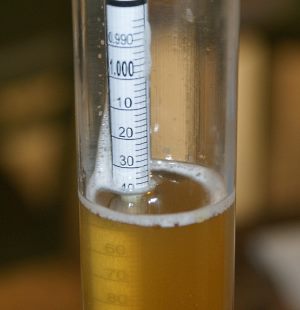property>specific gravity
What is Specific Gravity?

The Specific Gravity of liquids and solids is defined as a dimensionless unit which is the ratio of density of a material to the density of water at a given temperature, where density is defined as the material’s mass per unit volume and is measured in kg/m3. The temperature and pressure of both the material and water need to be the same as these factors influence the density and hence the specific gravity. Specific gravity is unique to every material and has a very wide range of application. In more general terms specific gravity is the ratio of the density of a material to that of any standard substance, although usually this is water at 4 degrees Celsius or 39.2 degrees Fahrenheit. By definition, water has a density of 1 kg per litre at this temperature.
The specific gravities of gases usually are compared to dry air which generally has a density of 1.29 g per litre. The specific gravity of all other materials is compared to water as a fraction heavier lighter or heavier density.
Calculating Specific Gravity
The following formula is used to calculate the specific gravity of a material.
SG = ρ / ρW
Where SG = specific gravity, ρ = density of the material (kg/m3), ρW = density of water ( kg/m3). The reference density of water at 4oC (39oF) is used as the reference as these are the conditions of maximum density.
Measuring Specific Gravity
There is a wide range of instruments designed to measure the specific gravity of a material. The hydrometer can be used to measure the specific gravity of any liquid. The device is designed to float freely at the liquid surface with a protruding stem giving a reading corresponding to the specific gravity of the liquid. Other instruments to measure specific gravity are the Pycnometer, and digital density meters based on oscillating U-tubes.
Applications of Specific Gravity
Specific Gravity has a wide range of applications including:
- Pharmaceuticals: The specific gravity is used to find out the purity of a drug since each of the constituents has a distinct specific gravity.
- Determining the additives used in a base material: Specific gravity is used to find out the amount of additives used in a base material which might affect the performance and stability of the base material.
- Urine Specific Gravity: The Urine Specific gravity (USG) is measured and used mostly in veterinary sciences to understand whether water is excreted or conserved in an appropriate fashion.
- Calculating volume of a fluid: The fluid’s volume can be calculated using the specific gravity of the fluid and the weight. Conversely the weight can be calculated if the volume is known.
- Other applications of specific gravity include fluid mechanics, buoyancy and the brewing industry.